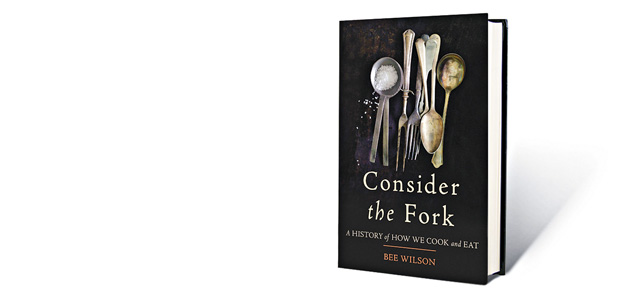Book Review: Consider the Fork, A History of How We Cook and Eat
By Bee Wilson
Publisher: Basic Books
Released October 2012
“There are fork cultures and there are chopstick cultures; but all the peoples of the world use spoons.” And so, after an introduction on the usefulness of wooden spoons, we dive into Consider the Fork, A History of How We Cook and Eat by Bee Wilson. In this book, Wilson, a food critic and historian, tackles what she calls the technology of the kitchen; namely why we use what we use to prepare, cook, and eat, and how that has evolved both our cultures and our diet over the past centuries.
But before we talk spoons, let’s dish about knives. I had never given much thought to the utilitarian utensil before reading this book, but knives are inherently dangerous. In fact, as Wilson points out, they are tools of violence. In medieval and Renaissance Europe you carried your knife on your body at all times. Wilson tells us, “Almost everyone had a personal eating knife in a sheath dangling from a belt.” These knives could be used to eat as well as, perhaps, pin someone against a wall. Yet times began to change, knives got duller, which both altered social skills (no picking food out of your teeth with your dagger) as well as the food (the duller the knife, the softer the food). What were these knives made of? Metal, of course. However, most metals have adverse reactions to certain foods, namely fish. This wasn’t resolved until the advent of stainless steel, in the twentieth century, which Wilson calls “another step towards domesticating the knife.”
The chapter on knives is an excellent example of the breadth of research that Wilson brings to her subject, as well as her knack for storytelling and her ability to take us through the history of a tool along with its impact on the world around it. We’re given this same comprehensive treatment in all eight chapters in the book: pots and pans, knives, fire, measure, grind, eat, ice, and kitchen. At the end of each chapter an implement is highlighted for its key stakes in the category. Such as the toaster, which was invented by Charles Strite, a mechanic from Minnesota who was fed up with the burned toast he was served at his work cafeteria. His patent, issued in 1921, introduced one of the first tools into the American kitchen that allowed you to turn your back on the cooking at hand.
The curious facts we learn throughout the book are worth the price of admission alone. Like did you know that before kitchen timers people used different songs (think Ave Maria) to judge how long a dish needed to cook? Or that a fourteenth-century advice book instructed a chef making pancakes to beat the ingredients “long enough to weary one person or two.” Two! And that sugar used to come in solid lumps or loafs, and were cut up into smaller bits using sugar nippers. Let’s not forget our namesake: the fork. Did you know that the first true fork, a two-pronged gold version was used by a Byzantine princess and possibly harder to believe, that it wasn’t until the seventeenth century that forks were considered anything but odd. The Italians of course were the earliest adopters. I mean, who eats pasta with spoons?
Wilson’s voice throughout, both light and engaging and educational, draws you along the history at a nice clip. She’s at her best when sharing historical stories, as seen in a delightful exchange about kitchen and communism between Nixon and Kruschev in 1959. While her movement through the subject matter felt too brisk at times, and in others a bit repetitious, her prose will certainly keep you engrossed. This sweeping book covers a great deal of ground and I could envision Wilson tackling a similar book with as many pages about one item: fork, spoon, knife, you name it. While reading the book you’ll find you want a pen handy to underline quirky and interesting and unique facts of our culinary history, maybe to look up later or maybe to dazzle dinner guests at your next meal. You might also want a snack within reach.
Larissa Zimberoff is a freelance writer living in Manhattan. She is currently working towards her MFA at The New School. Her writing has appeared in Salon, Untapped Cities and The Rumpus.



Comments are closed.